
A science show held for an audience of about 1,000 people (Images provided by Yonemura Denjiro Science Production)
There is a proverb in Japan that goes “Hyakubun wa ikken ni shikazu” (Hearing about something a hundred times is not as good as seeing it). This proverb signifies that you can understand something a lot better by seeing the real thing once rather than hearing someone talk about it even one hundred times.
With the science that you study at school, you can understand the subject matter better and you gain more interest by trying real experiments on top of listening to the teacher in classes.
Yonemura Denjiro is famous in Japan for performing science experiments on TV and on other occasions. He began hosting science shows in the 1990s at large venues in order to express the fun of science to the audience. These science shows are still very popular today, and are held at locations all across Japan.
Some of the experiments designed by Yonemura Denjiro have been incorporated into the science shows organized at science museums (buildings with exhibits about natural sciences) all over Japan. The science shows at these museums arrange the stage right in front of the audience, so you can see the experiments going on before your eyes.
There are more and more after-school classes—known as science classes or experimental classes—that let you study science through experiments. This trend shows that Japanese people have a strong interest in science experiments.
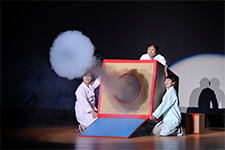
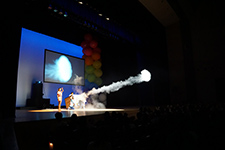
An experiment with an air cannon that makes donut-shaped smoke rings using rotating air currents (Images provided by Yonemura Denjiro Science Production)
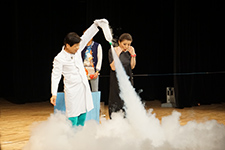
An experiment to replicate a rocket jet by vaporizing liquid nitrogen (Image provided by Yonemura Denjiro Science Production)

An experiment that uses huge balloons in order to experience the weight of air (Image provided by Yonemura Denjiro Science Production)
Science Shows at Museums Conduct Fun Experiments Right in Front of You
Science shows are held at science museums and other locations, where the demonstrator speaks as if to address each child at the venue while showing them many fun experiments one after the other to enhance their knowledge about science.
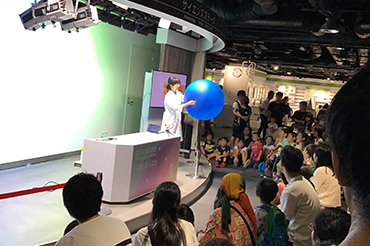
Held at science museums and other locations, science shows always demonstrate experiments right in front of the audience (Image provided by Toshiba Science Museum)
For example, experiments with static electricity may involve audience members being called to the stage to place their hands on a ball with static electricity and make their hair stand on end. Another experiment may involve taking a small bundle of finely-cut vinyl strings and making it float in mid-air. Through these experiments, you come to understand that static electricity features positive and negative charge. You also learn that objects with the same types of charge will repel each other and that objects with opposite charge will attract each other, just like the north and south poles on magnets.
Another experiment creates lightning by discharging static electricity in the air using a special machine called a Van de Graaff generator. The venue is kept dark for this experiment, but it is lit up for a split second by the lightning.
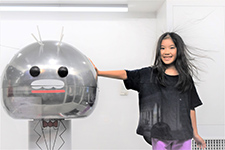
An experiment using static electricity to make a participant’s hair stand on end (Image provided by Toshiba Science Museum)
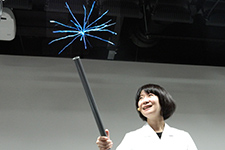
An experiment to make vinyl strings float in the air using static electricity (Image provided by Toshiba Science Museum)
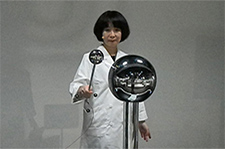
An experiment using a Van de Graaff generator to create lightning (Image provided by Toshiba Science Museum)
Science Classes and Experimental Classes Let You Experience Science Hands-On Through Experiments
Science classes let you do experiments yourself, allowing for an even more personal experience than science shows. Also known as experimental classes, they let you do many more experiments than the ones you see in science shows or school lessons.
Each class offers a different program, but they all feature a wide range of experiments. For example, you might use a microscope to look at microorganisms that live in water, or you might shake test tubes in a chemistry experiment. You might even make an electromagnet by wrapping a wire around an iron core.
Using test tubes, flasks, and other experimental equipment, you can feel things with your own hands, witness things directly with your own eyes, and even check the smells of things. In this way, you can experience science in a truly engaging way that is totally different from just listening to a lecture or watching a video.
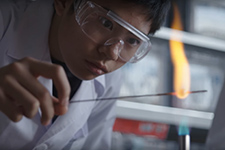
An experiment to make Tonbo-dama (glass beads used for decoration) by melting a glass rod (Image provided by Science Club)
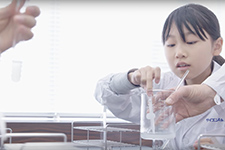
Investigate the secrets of the digestive organs by using saliva to change starch paste into sugar (Image provided by Science Club)
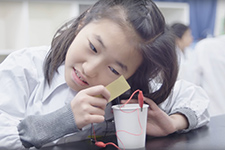
Generate electricity and play music using a battery made by simply placing metal plates in salt water (Image provided by Science Club)
Learning the Fun of Science and Expanding Your Interests Through Experiments
Science has made great progress up to the present day by verifying hypotheses through repeating experiments many times.
Children who discover the fun of experiments through science shows, science classes, and experimental classes are sure to support scientific efforts in the future.